- Track your orders
- Save your details for express checkout
Blog - Trailer World
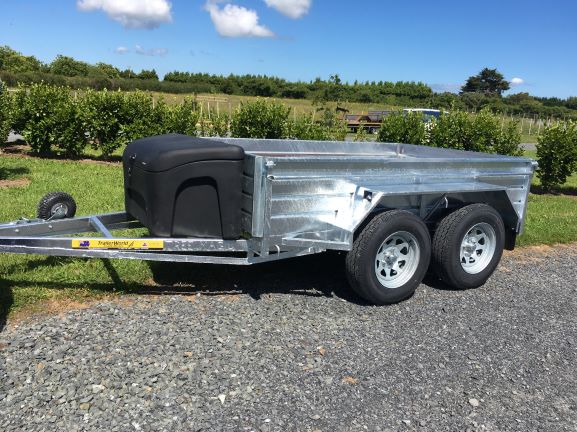
Complete Guide to Tandem Axle Trailer
In this extensive guide, we take a deep dive into the tandem axle trailer, a reliable alternative to the single axle trailer. We will cover the benefits of owning a tandem axle trailer, the advantages and disadvantages and how to make the most of its many uses.
If you’re looking into buying a tandem axle trailer, this guide will surely provide you with all the information to make an informed decision whether it's the right trailer for you.
What is a tandem axle trailer?
A tandem axle trailer, also going by dual axle trailer, double axle trailer, or two axle trailer – is a much larger trailer than a single. Unlike single axle trailers, tandem axle trailers feature two axles with wheels on both ends which means it has a greater load capacity and better stability on the road.Tandem axle trailers are the most commonly preferred type of trailer when it comes to substantial hauls like transporting construction materials, heavy machinery, large boats, and more. This is mainly because they can carry more weight without compromising on stability.
With its four wheel design instead of two, it significantly reduces the sway and bounce when driven on the road which can sometimes occur with single axle trailers.
Key components of a tandem axle trailer
A tandem axle trailer incorporates several key components, each playing a crucial role in ensuring its functionality and safety. Getting familiar with these elements will help you recognise the signs of wear and tear early on which means you can action repairs sooner rather than later and reduce the risk of accidents.Here are the key components to note:
Axle
In a tandem axle trailer there are two axles that support the frame and these are arranged sequentially to distribute the load evenly across its four tires. The axle is central to the trailer’s design as it determines the weight the overall trailer can load, making it important to consider the axle capacity when selecting a trailer for specific hauling needs.The dual axle configuration also allows for better shock absorption during travel to give you and your load a smoother ride, especially when road conditions are less than optimal
Wheels & tires
The wheels and tires are the most important component as they get the most use when it’s on the road. Quality tires, along with the correct load capacity of the trailer, are essential for safe and efficient transport. Always undergo regular inspections of your tires to make sure they remain in good condition. Additionally, proper tire pressure should be maintained so that the trailer can continue working in optimal condition.Frame
The frame serves as the skeleton of the tandem axle trailer. It provides the structural foundation that supports the load. Most tandem axle trailer frames are fabricated from steel or aluminium and designed to be robust.Knowing your tandem axle trailer frame’s composition and structure will help determine the trailer's load-bearing capacity and compatibility with various types of cargo.
Hitch
For a tandem axle trailer, the hitch is connected between the trailer and the towing vehicle. It’s important to use a hitch that is compatible with the towing vehicle’s hitch type and has a rating suitable for the weight of the loaded trailer. Proper hitch selection and installation will mean a safe and secure towing experience and prevent any accidental detachments while transporting.For a tandem axle trailer, each component above plays an important role and has a specific function. Having an understanding of them enables you to have a safer and more efficient use of the trailer. When you maintain each component properly, you can ensure the longevity and reliable performance of your tandem axle trailer.
Advantages of a tandem axle trailer
Tandem axle trailers come with a host of advantages that cater to both casual and professional users. Below are some of the advantages of a tandem axle trailer and how it stands tall amongst other types of trailers.- Higher load capacity – Tandem axle trailers can carry significantly heavier loads compared to single-axle trailers, making them suitable for hauling more substantial and heavier items.
- Better stability – Thanks to the additional axle design, these trailers offer better stability, especially at high speeds, thus reducing the risk of swaying and providing a smoother ride.
- Better traction – With four tires on the ground, these trailers offer better traction on slippery roads, enhancing safety in even the roughest of weather conditions.
- Better braking system – Tandem axle trailers often come with more efficient braking systems, providing better control during stops and reducing the stopping distance.
- Improved weight distribution – The design of tandem axle trailers allows for better weight distribution of the load, reducing the strain on the towing vehicle and ensuring a more balanced load.
And for those planning to take on long-distance hauling or transport, tandem axle trailers provide a much safer and more stable option.
Tandem axle trailers overall allow for a larger and efficient towing experience which makes them a valuable asset for both commercial and recreational uses.
Disadvantages of a tandem axle trailer
While tandem axle trailers offer a range of benefits, including improved stability and increased load capacity, they do come with a few drawbacks. It’s also important to consider the possible disadvantages to make an informed decision if a tandem axle trailer is right for you.- Higher initial cost – Compared to single axle trailers, tandem axle trailers are generally more expensive to purchase brand new.
- Higher maintenance costs – It should be no surprise that with more wheels and bearing, the maintenance needs are heightened and therefore will require more servicing and check-ups to ensure everything’s up to standard.
- Increase in fuel consumption – Due to the increased weight of tandem axle trailers, they tend to consume more fuel compared to their single axle counterparts.
- Challenge in manoeuvrability – While they offer more stability, the extra axle can make them less manoeuvrable in tight spaces, making it difficult to navigate through narrow roads or parking in confined spaces.
- Increased tire expenses – With more tires in use, the chances of experiencing a flat or needing to replace tires are doubled, leading to increased operational costs over time.
Understanding the potential downsides of tandem axle trailers is key to making an informed purchase decision. When you consider both the advantages and disadvantages of a tandem axle trailer, only then will you get a better idea of whether it matches up to your trailer needs.
Applications for a tandem axle trailer
Now that we’ve looked into the components of a tandem axle trailer as well as the pros and cons, let’s list down the many uses of a tandem trailer. We know that they’re a popular choice for individuals and businesses but what else can you carry on a tandem axle trailer?
Here are various applications for a tandem axle trailer:
- Transporting heavy equipment or machinery
- Transporting large quantities of building materials
- Transfer large harvest loads with ease
- Tow boats, large campers and other vehicles
- Assist with house moves
- Transfer motorcycles, ATVs and other vehicles from one location to another
- Transporting of livestock
- Transporting state equipment for events
- Carry heavy tools and machinery
Each of these applications makes the most use of the tandem trailers’ high stability, increased load capacity and smoother road handling which opens them up as a solution to a wide range of transportation needs.
Why choose Trailer World for your tandem axle trailer
When it comes to selecting the right tandem axle trailer, partnering with a reliable manufacturer like Trailer World is a wise choice. With a strong focus on innovation and customer satisfaction, Trailer World offers custom trailers to meet all your transportation needs, assuring quality and reliability in every product. Contact us today to find the tandem axle trailer that is suitable for your needs.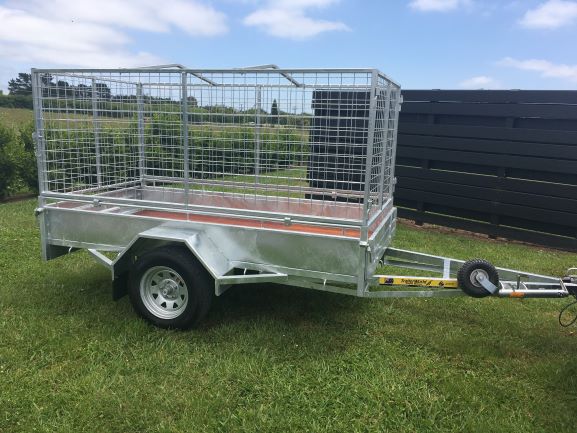
Complete Guide to Single Axle Trailer
Whether you're considering purchasing a trailer, or simply wish to enhance your knowledge, this guide is here to assist. You'll be equipped with the essential information you need about single axle trailers, ensuring you make informed decisions and use them efficiently.
What is a single axle trailer?
A single axle trailer is a trailer with only one axle and a wheel on each end. This configuration, while simpler in design compared to dual-axle trailers, offers several advantages for certain applications.Single axle trailers are typically smaller in size and lighter in weight, making them easier to manoeuvre in tight spaces and around buildings. This improved manoeuvrability can be particularly beneficial when parking in areas with limited room or navigating sharp corners.
Because of their compact size, single axle trailers are more fuel-efficient compared to their dual-axle counterparts. They have fewer parts to maintain, resulting in lower upkeep costs. Additionally, single-axle trailers are generally more affordable to purchase initially, making them an attractive option for those on a budget.
Understanding the components of a single axle trailer
A single axle trailer, by design, is a fairly simple piece of equipment but each component plays a crucial role in ensuring the trailer's effective and safe operation. Understanding these components is essential to get the most out of usage, maintenance, and safety. When you start to recognise the signs of wear and tear on any of these components, you can address them properly and reduce the risk of accidents on the road.Axle
The axle is one of the most critical components of any trailer. Serving as the central rod or shaft, it supports the weight of the trailer and its load, allowing the wheels to rotate freely. The axle's strength and durability directly determine the amount of weight a trailer can safely carry.Wheels
The wheels, or more specifically, the tires, are the points of contact between the trailer and the road. They're tasked with the critical role of safely transferring the load's weight and the dynamic forces during movement to the road surface. Quality tires ensure efficient movement, grip, and safety, especially under varying road conditions. Tires must be chosen based on the trailer's intended load capacity and use.Frame
The frame, often referred to as the chassis, is the trailer's skeletal structure. It provides the foundational support and determines the overall strength and integrity of the trailer. Typically made of materials like steel or aluminium, the frame is designed to bear and distribute the load's weight across its structure, ensuring stability and safety.Hitch
The hitch coupler acts as the connecting interface between the trailer and the towing vehicle. This component is more than just a physical connector; it's a crucial safety device that ensures the trailer remains securely attached during transportation. The hitch coupler should be appropriately matched with the towing vehicle's hitch type and should be rated for the trailer's weight.A single axle trailer might seem basic in its construction, but each part is integral to its function. Taking the time to understand these components and their importance is not just recommended; it's imperative for anyone looking to use their trailer efficiently, safely, and effectively.
Benefits of a single axle trailer
Single axle trailers have become a go-to choice for many, thanks to the many advantages that they bring to the table. Whether you're a casual user looking to transport goods occasionally or a professional requiring a reliable means of moving materials, single axle trailers are a staple in the world of transportation. Here are some of its advantages to consider:Better fuel economy
Single axle trailers are known for their improved fuel efficiency compared to dual-axle trailers. Their smaller size and lighter weight contribute to reduced fuel consumption, making them a cost-effective choice for long-distance towing.Easy to manoeuvre
With only one axle and two wheels, single axle trailers offer enhanced manoeuvrability, making them ideal for navigating tight spaces and sharp turns. This flexibility can be crucial when towing in urban areas or confined environments.Lower maintenance costs
Single axle trailers have fewer components, resulting in reduced maintenance requirements and costs. With only two tires and their associated components to maintain, upkeep becomes more manageable and economical.Affordable purchase price
Single axle trailers are typically less expensive to purchase initially compared to dual-axle trailers. This affordability makes them an attractive option for individuals or businesses operating on a tighter budget.Lightweight and better steering
The lightweight nature of single axle trailers enhances the steering capabilities of the towing vehicle. It also contributes to shorter stopping distances, exerting less strain on the vehicle's brakes and tires.Drawbacks of single axle trailer
Single axle trailers, while popular for their simplicity and manoeuvrability, do come with certain disadvantages and risks that potential users should be aware of. Here are a few to note:Limited load capacity
One of the main drawbacks of single-axle trailers is their relatively lower load capacity compared to other trailers. The weight of the load is concentrated on a single axle, potentially limiting the amount of equipment or material that can be hauled.Potential for greater wear and tear
Single axle trailers may experience increased wear due to the concentration of weight on a single set of tires. When hauling heavy loads, the tires may wear out faster, leading to more frequent replacements.Less stability
Single axle trailers without suspension may have less stability or load cushioning when travelling over bumps or uneven surfaces. This can result in a less comfortable towing experience and potential damage to the cargo.Possible lack of brakes
Some single axle trailers may not come equipped with brakes, depending on their weight and local regulations. It is essential to comply with the braking system regulations in your area to ensure safe and legal towing practices.While single axle trailers offer a range of benefits, it's crucial for potential users to be fully aware of their limitations and the associated risks.
Best uses of single axle trailers
Single axle trailers are well-suited for a variety of uses, particularly when dealing with smaller loads and lightweight cargo. While they may not be the largest trailers available, they are still capable of effectively transporting a range of items. Some common applications for single-axle trailers include:- Hauling large appliances
- Transporting building supplies
- Moving furniture
- Carrying lawn care equipment
- Towing motorcycles
- Transporting landscaping materials such as mulch, dirt, stone, and sand
- Hauling off-roading vehicles
- Towing small tractors
There are many applications to a single axle trailer but the important thing is to be aware of the weight limits of single-axle trailers and to avoid overloading them. Exceeding the maximum weight capacity can lead to potential safety hazards, damage to the trailer, and increased risk of accidents.
Why choose Trailer World for your single axle trailer
Choosing the right single axle trailer comes with a lot of considerations—from understanding the structure of the trailer down to its practical uses on a day-to-day basis. Having read this guide on single axle trailers you should now be in a better position to make the right decision in getting the right trailer for your needs.Finding a trailer manufacturer that understands their products and displays trust and reliability there’s no other manufacturer like Trailer World. Trailer World offers quality trailers combined with innovation and a strong focus on customer needs. Trailer World are also known for custom trailers and can meet all your trailer transportation needs. Turn to Trailer World to find solutions to all your questions and to find a single axle trailer that truly ticks all the boxes. Contact us today.
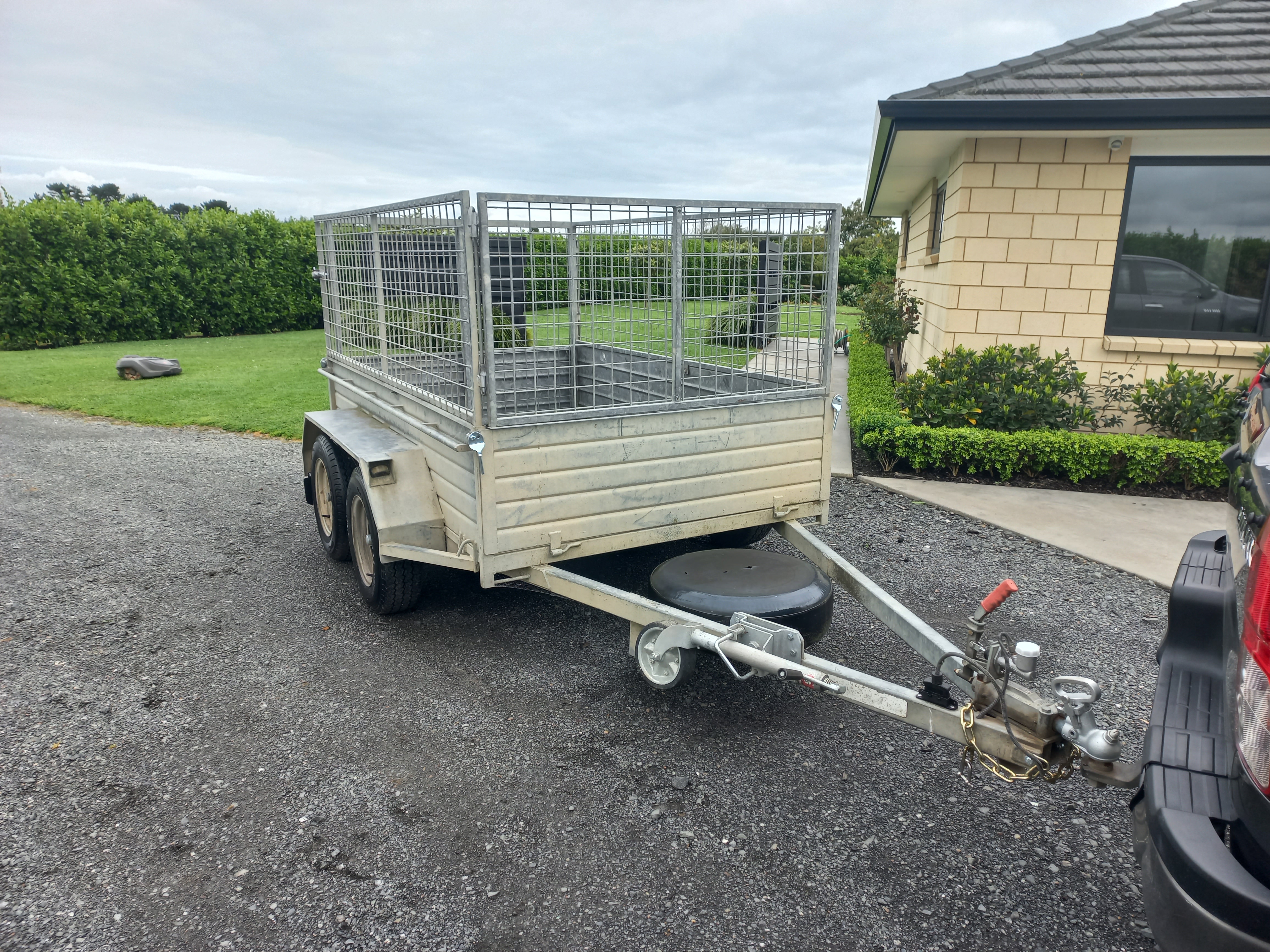
Why Used Trailers Are A Smart Choice For Budget-Minded Buyers
Cost saving
One of the biggest advantages of buying a second hand trailer is the potential to save costs.New trailers can be expensive, and the cost of ownership can quickly add up. However, buying a used trailer can save buyers a significant amount of money. They can often find high-quality trailers at a fraction of the cost of a new one. By opting for a used trailer, budget-conscious trailer buyers can enjoy the benefits of owning a trailer without breaking the bank.
Durability
Many older trailers were built with high-quality materials and workmanship, which means that they have stood the test of time and are still in excellent condition. These trailers were designed to be durable and long-lasting, so they are often still in good shape even after several years of use. Because they were built to last, older trailers may require less maintenance than newer models, which can save buyers even more money in the long run.Range of options
While it might not seem like it, buying used trailers can offer a wider range of choices and models if you’re looking for a specific one to meet your needs. Unlike with new trailers, which have limited options and features, the used trailer market offers a vast array of models, sizes, and styles to choose from. This means that buyers can find a trailer that meets their specific needs and preferences without having to pay the high prices of a new trailer. You can search for trailers that fit your specific needs, such as a trailer that is the right size, has the right towing capacity, or has the specific features you require.
Additionally, because used trailers have been around for a while, there are often many online resources available that provide information on the different types of trailers and their features so that the buyer can make a much more informed decision. Buying a used trailer also gives the buyer the ability to ask the previous owner about the best features and usage of the second hand trailer they are selling.
Additionally, because used trailers have been around for a while, there are often many online resources available that provide information on the different types of trailers and their features so that the buyer can make a much more informed decision. Buying a used trailer also gives the buyer the ability to ask the previous owner about the best features and usage of the second hand trailer they are selling.
Modifications
In most cases, previous trailer owners would make modifications to their trailer to improve the efficiency and use of their trailer. These modifications are one of the best reasons why used trailers are a smart choice for buyers. When purchasing a new trailer, buyers are limited to the options and features offered by the manufacturer. However, when buying a used trailer, they have the opportunity to purchase a trailer that has already been modified by the previous owner. These modifications may include upgrades to the interior or exterior, modifications to the layout or design, or the addition of special features or equipment. By purchasing a used trailer with modifications already in place, you get a much better bang-for-your-buck trailer that suits your needs and preferences.
When buying a used trailer, it's important to do your research and ensure that you're getting a quality product. You can check the trailer's history and maintenance records to ensure that it has been well-maintained and is in good working order. Additionally, you can inspect the trailer in person or have a professional inspect it for you to ensure that it meets your standards.
In summary, buying a used trailer is a smart choice for budget-minded buyers as it can save money while still enjoying the benefits of owning a high-quality trailer. With proper research and inspection, you can find a quality used trailer that will serve you well for years to come. Trailer World is proud to supply quality used trailers that have been tested and repaired for continued use. All our used trailers meet road safety standards and can handle New Zealand's harshest weather conditions. Find out more or give us a call today to see how we can meet your trailer specifications and needs.
When buying a used trailer, it's important to do your research and ensure that you're getting a quality product. You can check the trailer's history and maintenance records to ensure that it has been well-maintained and is in good working order. Additionally, you can inspect the trailer in person or have a professional inspect it for you to ensure that it meets your standards.
In summary, buying a used trailer is a smart choice for budget-minded buyers as it can save money while still enjoying the benefits of owning a high-quality trailer. With proper research and inspection, you can find a quality used trailer that will serve you well for years to come. Trailer World is proud to supply quality used trailers that have been tested and repaired for continued use. All our used trailers meet road safety standards and can handle New Zealand's harshest weather conditions. Find out more or give us a call today to see how we can meet your trailer specifications and needs.
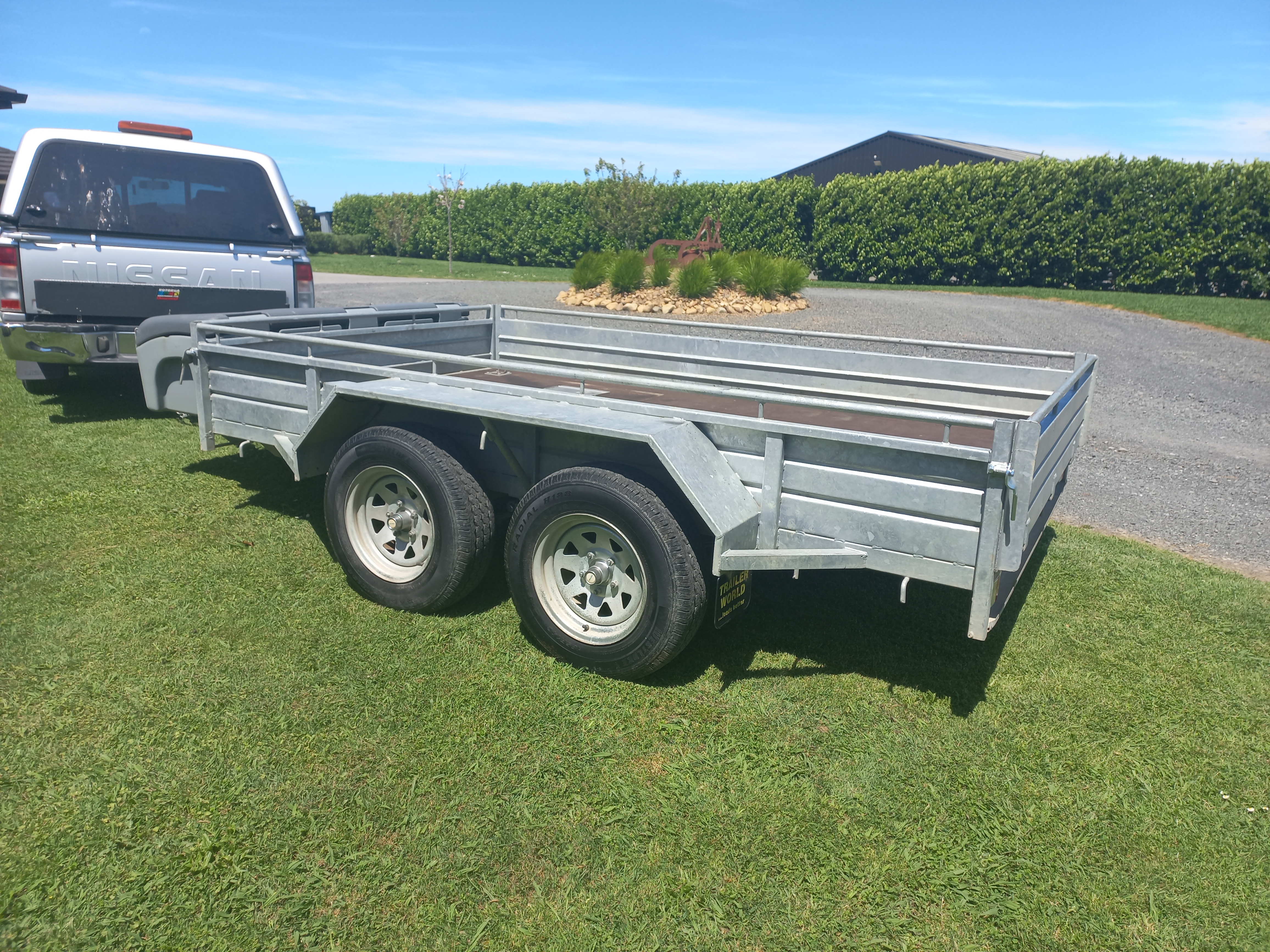
How to Load a Trailer Safely
We’ve put together a guide to safely loading the trailer and checks you can do that can help protect you, your goods as well as others on the road.
Check towing and vehicle capacity
Before you begin loading the trailer, you need to check the trailer’s capacity along with your vehicle’s towing capacity. If your vehicle is going to tow a trailer that exceeds its capacity, it can cause serious damage to your vehicle and can cause hazards when driving on the road. Check that your trailer coupling and chains match the vehicle and trailer, and ensure these are securely fastened before you get started.Secure on a flat surface
Park your trailer as close to the area where you’re loading and ensure the vehicle is on firm, flat, level ground. Make sure your trailer is hooked to your vehicle firmly and your vehicle is in park as well as having the emergency brakes applied. Chocking the tyres can add extra reassurance that your trailer stays in place while loading your goods.If you’re parked on the side of the road, make sure you are out of the way of traffic and if you have a cone, put it behind the car and trailer with room for loading, to mark it from oncoming traffic. Some heavy duty trailers might come with tie-downs or D-rings. Make sure to inspect them for any wear and tear, and then prepare and inspect the straps or chains if you are using them to secure the goods once it's all loaded in the trailer. If you need to use a ramp to help bring the load on the trailer, make sure they are stable and positioned at a steady incline from the flat surface.
Different loads should be transported differently. If you have smaller items or similar items, it's best to bundle them together as a more single, stable unit. Be prepared to use anti-slip matting for longer loads to prevent items from sliding, especially long materials. Make sure heavy items are not loaded on top of lighter items, fill any gaps between piles with other items and restrain all these well.
Secure your load
Time to put restraints on your goods and secure them for the road. Most people use a combination of tarps, tie-down ratchets, ropes, and chains. Whichever method you want to use to restrain the load it’s important you secure it carefully – you don’t want to lose anything along the way. Ensure the restraints have a significant amount of tension on them but not too tight that it could cause damage when it's on the road.Lastly, if there are any excess straps, make sure they are tied up and out of the way so they don’t flap around or get caught in the wheels.
Keep load within the trailer
One of the biggest hazards that drivers towing a trailer pose to other road users is a load that sticks out from the trailer at either the back or the sides. A load cannot project more than 1.2 metres beyond the rear of a trailer. If you find that your goods or materials are exceeding at the rear, then it needs to have either a brightly coloured flag or warning signals that can be seen for at least 200 metres when driving at night.Pre-trip checklist
Before hitting the road with your precious load safely strapped down, there are a few pre-trip trailer checks you can do to make sure everything is safe and ready to go.Trailer checklist pre-trip:
● Check brakes and brake connections
● Check parking brake
● Check all lights and reflectors
● Check tyre pressure
● Check coupling
● Check the spare wheel is attached to the trailer tightly
● Check all wheel nuts are tight
● Check parking brake
● Check all lights and reflectors
● Check tyre pressure
● Check coupling
● Check the spare wheel is attached to the trailer tightly
● Check all wheel nuts are tight
Once the goods are loaded, do a walk-around to check you’ve secured the ramps and attached your safety chains, Ensure that the trailer chains and electrical connections are hooked to your towing vehicle and all straps are tight before setting off.
You are now ready to hit the road! While driving with the trailer, handling can be a bit difficult with trailers more prone to moving side to side, so it's important to take corners and roundabouts carefully. It is worth pulling over and checking the trailer every so often to ensure the straps are correct and the load is secure.
For all your trailer and trailer accessories, Trailer World has you covered. At Trailer World, we believe in safety and quality, which is why our products are not only manufactured for New Zealand conditions, but they also meet industry safety standards. We only have the best trailers and trailer components for smooth and safe transport. Talk to us today about how we can help you with your trailer needs.
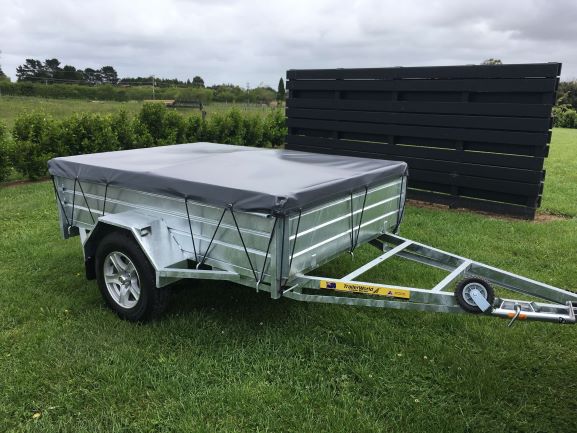
Choosing Between Single Axle vs Tandem Axle Trailer
Knowing the differences between these two types can help determine which is the better choice for you. There are a lot of reasons one style may be suited for certain situations than the other, so let’s take a closer look at each one.
High Sider Single Axle Trailer
Single axle trailers are available as High Siders Trailers (above) or as Heavy Duty Handyman Trailers (below)are by far the most popular and common of the two types and are more often than not the ideal trailer for most uses.
Heavy Duty Handyman single axle trailer
But what is a single axle trailer? A single axle trailer has one axle with a wheel on each end. Single axle trailers are typically smaller and have a lower GVM(gross vehicle mass). Because of their size, single-axle trailers are easier to maneuver in tight spaces and around buildings with limited room and sharp corners.
The high sider usually has double the volume of the heavy duty handyman.
A single axle trailer is used for lighter loads and usually doesn’t come with any brakes making it the most affordable and lightweight trailer of the two.
Streamlined Solution
The simple design of the single axle trailer makes upkeep less expensive and they are also more fuel efficient. The design makes it easy to maneuver and steer, and is especially beneficial when stopping. Hauling a trailer with a single axle means less weight to manage and fewer components to maintain.The downside to this option is that because there is only one set of wheels holding the unit it adds more stress to the tyres and you may not get good stability over bumps on the road. Also, depending on the size of the overall trailer, there may be load capacity limits which impact how much equipment or material you can transport.
Uses For Single Axle Trailers
Single axle trailers are best used for smaller loads or lightweight materials. They’re ideal for hauling things like:- • Appliances
- • Furniture
- • ATV
- • Motorcycles
- • Building materials
- • Small tractors
- • Farming equipment
- • Bark, mulch and plants
It’s important to be aware of the trailer’s weight limit and size when you buy a single axle trailer. If you know what type of equipment or material you want to haul, be sure to look for a unit that can support its weight. Single axle trailers can still get the job done despite their size and limitations.
High Sider Tandem axle
Tandem Axle Trailer
Dual axle or tandem axle trailers have a whole lot more advantages particularly when it comes to size and loading capacity. As you would expect, more axles and more wheels means bigger and heavier loads.
Tandem axle trailers come with two sets of wheels with the second axle positioned directly behind the first, and both axles have wheels on each end. With four tyres holding up the unit instead of two, a dual-axle trailer can evenly disperse the weight of the load which makes these trailers more stable when it comes to loading, unloading, and travel.
Braked tandem axle trailers carry higher load capacity with added stopping power the tandem axle trailer gives you more room to haul massive loads and can withstand long distance towing. Although it is more expensive than a single axle trailer, they deliver a higher return on investment in the long run
Tandem axle trailers come with two sets of wheels with the second axle positioned directly behind the first, and both axles have wheels on each end. With four tyres holding up the unit instead of two, a dual-axle trailer can evenly disperse the weight of the load which makes these trailers more stable when it comes to loading, unloading, and travel.
Braked tandem axle trailers carry higher load capacity with added stopping power the tandem axle trailer gives you more room to haul massive loads and can withstand long distance towing. Although it is more expensive than a single axle trailer, they deliver a higher return on investment in the long run
Premium Commercial Braked Tandem
Stability & Safety
A tandem trailer may be the best option for you and your business if you need to transport heavy loads over a long distance. Tandem axle trailers offer extra stability with their rocker slipper suspension system making going over bumps a lot easier. You can even improve the safety of your load trailer by adding bars or a cage. Correct loading of your trailer is critical to safely towing on any road.
In most cases, tandem axle trailers have braking systems independent of the trailer. The braking system could either be electric or hydraulic depending on the trailer brand. Having brakes makes towing heavy items much safer and allows a better stopping distance.
The disadvantage of a tandem axle trailer is that because of its bigger weight and size it costs more than the single axle trailer. It can be more difficult to manoeuvre in tight spaces and has a limited turning radius with four wheels. Also with the size and weight of the trailer, this will also increase your fuel consumption and potential maintenance cost with its more complex design.
In most cases, tandem axle trailers have braking systems independent of the trailer. The braking system could either be electric or hydraulic depending on the trailer brand. Having brakes makes towing heavy items much safer and allows a better stopping distance.
The disadvantage of a tandem axle trailer is that because of its bigger weight and size it costs more than the single axle trailer. It can be more difficult to manoeuvre in tight spaces and has a limited turning radius with four wheels. Also with the size and weight of the trailer, this will also increase your fuel consumption and potential maintenance cost with its more complex design.
Uses for Tandem Axle Trailer
Tandem axle trailers can carry many (if not more) of the same items as a single axle trailer. With a tandem axle trailer you can haul larger ATVs and larger appliances. More uses for a tandem trailer are:
- • Heavy equipment
- • Generators
- • Heavy industry machinery
- • Heavy farming equipment
- • Bulk items
- • Vehicles
- • Machinery
- • Livestock
The heavier the items you need to haul, the bigger your trailer needs to be. Make sure you’re aware of the trailer’s maximum weight and load capacity before you buy a tandem axle trailer.
So Which is The Best?
There are plenty of considerations to make when it comes to getting yourself a new trailer, with the axle being only one part of this decision. Nevertheless, it is an important factor that will affect the towing experience and the overall completion of the job. Both a single and tandem axle trailer can transport a wide range of items within their weight limits as efficiently as the unit allows.
If you find yourself in a tough situation where you have to choose between a single or tandem axle trailer, consider getting help or advice from the trailer experts at Trailer World. Our team will partner with you to discuss your needs on the job and narrow down the best trailer option for you. If we can’t find the right one, we would be happy to build a custom trailer for you that fully aligns with your trailer needs. In addition, we also offer trailer repairs, trailer maintenance and spare trailer accessories as well as other trailer services that you may need. Contact us today and talk to our trailer experts.
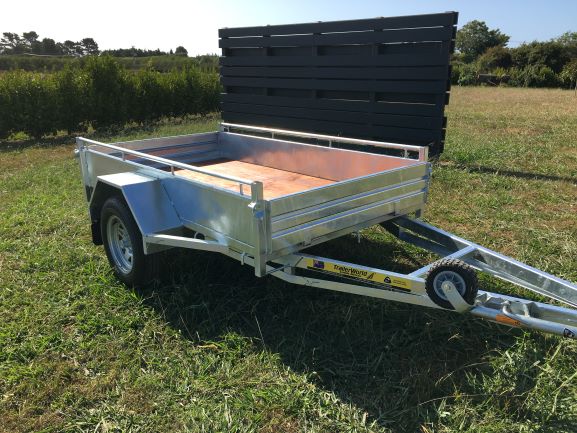
Benefits of Getting a Custom Trailer
That’s why getting a custom trailer manufactured is a great idea. With a customised trailer, whether hauling a car, horses or heavy equipment, it means that you can transport your loads in ways that best suit you. Custom trailers are often the very best answer for people looking for a trailer that fits them like a glove.
Here are some of the main reasons you might want a custom built trailer:
Custom sizing
One of the most frequent problems with buying trailers is that they’re not always the correct size. Some trailers might be too small, or even too large that there’s too much extra space for equipment to move around in. When you choose to build a custom trailer, you know you’ll have the exact size that you need to get the job done.As long as you observe the laws about maximum trailer size and make sure you have a vehicle with the towing capacity to pull the trailer, you can design a trailer for any purpose.
Custom weight
When you customise a trailer, you can also make changes to width and height. If your car or truck is not able to deal with the weight of your trailer, you have two options — buy a bigger vehicle or build a custom trailer that works with your current vehicle.If you’re unsure about maximum trailer load weight capacity, our trailer experts and their many years of industry knowledge will design a custom trailer for you to meet standard requirements.
Custom shape
Anyone who has ever owned a prefabricated trailer knows the frustration of not being able to load an odd-shaped item into the trailer because of its size or shape. If you know you’re frequently going to carry odd-shaped items that don’t conform to the regular sizes of a standard trailer, using a customised trailer can solve that problem.Additional security
Not only can you add more inches to your trailer’s length, width or height, but you can also have the option to increase security. It’s possible to place alarm systems or additional locks on your trailer to give you that extra peace of mind when you’re hauling expensive equipment and items. Also, if you’re transporting perishable goods or livestock, having custom walls and roofing can keep them safe and comfortable.Increase efficiency
Getting a custom trailer made to your needs and specifications can make it thoroughly efficient for your business, personal, or recreational use. Not only will custom design features help with efficiency, but they also make the trailers last longer and ensure they’re capable of handling tough terrains.Additional storage
Additional storage is one of the more frequent needs of people who own trailers. You might not think that you would need storage until you use your trailer for a couple of years and realise it would suit a ute storage box, but is there room to add storage? Customising your trailer with a trailer storage box in mind can provide you with the exact sizing that takes into consideration smaller items for storage. With a custom trailer, you can have a sectioned space built with a lid or cover to transport all kinds of equipment.Customisation provides you with endless opportunities to create the trailer of your dreams. Instead of spending hundreds of extra dollars on the biggest and latest trailer model that might not deliver what you need, investing in a custom trailer with all the features and designs made to your specifications can be the best choice.
Ready to explore your custom trailer options? Chat with the friendly staff at Trailer World. We are happy to answer questions and guide you through the process. Trailer World has helped many customers create a range of custom trailers. They are ready to help you customise a trailer that will suit all your business and personal needs and work hard for you for many years.
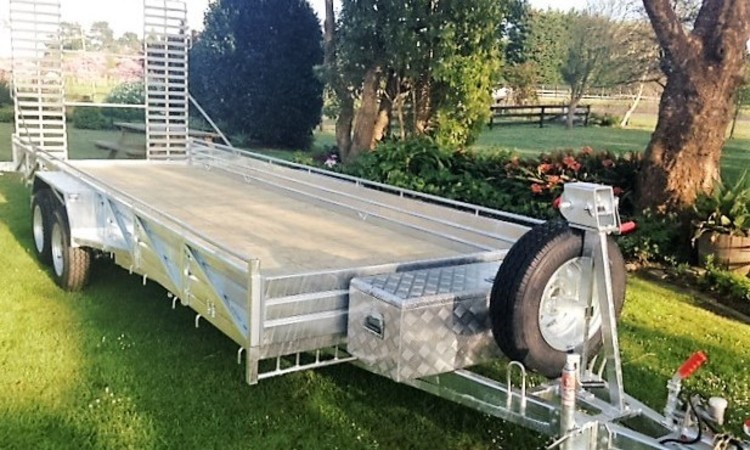
How to Properly Maintain Your Trailer
Ideally, a trailer should be inspected after each use, and there are various components that require attention on a regular basis. And since Trailer World has been manufacturing trailers for over 20 years, we have a solid understanding of how to look after them as well. Read our advice and guide below on how to keep your trailer on the road and in good operating condition for years to come.
Keep your trailer clean
At times, trailers are called upon to do some quite dirty jobs. Whether you're hauling rubbish in a cage trailer, carrying garden waste in a heavy-duty trailer, or dirt or sand in a tipping trailer, you'll need to clean your trailer thoroughly on a regular basis to keep it functional. Otherwise, if the trailers are left uncleaned for a lengthy period of time, dirt, grass clippings, debris, and soluble salts can build up and cause damage. However, a good hosing down and a scrub with a heavy brush on a frequent basis should typically suffice.A great tip for any trailer: when it is not being used, store it with the front lifted to prevent water from pooling in spots where it could cause erosion and other damage.
Check trailer parts for proper lubrication
Dirt and dust particles can cause friction in the moving components of your trailer. Keeping the moving parts of your trailer lubricated will extend the life and reduce friction and corrosion.The wheel bearings are one of the most important parts. Make sure they are well greased and the wheels turn freely without noise.
Make sure your lights work properly
Keeping your trailer in good condition requires keeping its lights in perfect working order. Take some time to check the wires on both your trailer and your vehicle to verify the wiring is in good shape. Keep an eye out for areas that are rusted, worn, or cracked. If you find any weak points in the wiring, make sure to wrap it in electrical tape multiple times to insulate it.It's also a good idea to physically ensure that all the lights on your trailer are operating properly, in addition to the connections and electrical lines. This means that the trailer's brake and tail lights turn on as soon as the towing vehicle's, the indicators are in sync, and the hazard lights working.
Ensure the tow coupling is in good condition
The first step in safe towing is to make certain the vehicle and trailer are properly attached, which requires a well-maintained trailer coupling. That's why you should inspect the hitch on a regular basis to ensure that no bolts or parts have become loose. At the same time, check if your vehicle's tow ball is secure and doesn't wobble or spin about. Finally, don't forget to connect the chain.Keep the tyres well maintained
Since the functioning of your trailer is primarily dependent on its tyres, it's a good idea to keep them well maintained, check the air pressure in your tyres prior to every trip and then fill them if necessary.Check the tyres with a gloved hand for damage, perishing from sunlight, punctures, or things stuck in the tyre. If you use the trailer regularly, check the tread with a tread gauge. Also, make sure the valve stems are in good working condition as well.
Congratulations! With just a little effort on your part, your trailer is back in great shape and ready for action. It's time to hit the road.
If you need more information on how to maintain your trailer and keep it in good operating order, or if you simply want to learn more about our trailer range, give our trailer experts at Trailer World a call on 0800 286 966.
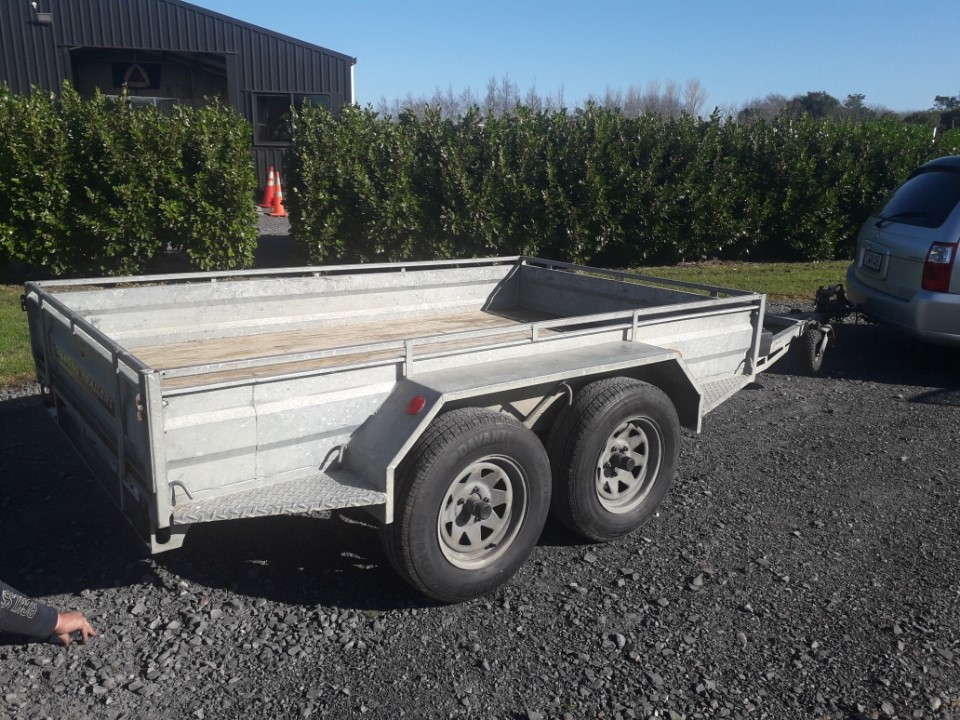
Safely Operating a Trailer On & Off the Road
Before you hit the road:
- Make sure the trailer's towing capability matches the cargo weight before attaching it to a vehicle. Look up the actual weight capacity of your towing vehicle in the owner's manual and on the tow bar itself. Also, keep in mind to include the weight of the trailer in your estimates.
- Ensure that the trailer is securely attached to the hitch. The trailer coupling should be correctly fastened to the vehicle tow ball, with the locking mechanism snapped and the lock pin in the right position, for a conventional ball hitch. If the hitch isn't properly secured, it may come loose and cause damage to the vehicles and others around it. A trailer connection to a vehicle should also have a safety chain connecting the car and the trailer, for 2500kg rating this requires twin chains criss-crossing in an X pattern.
- Check the trailer connection by trying to pull it off the hitch, which you should not be able to do. If you managed to pull the hitch off, it has to be reattached. Also, make sure the connection is clear and that all trailer wheels or stands are in the up or driving position.
- After that, check the trailer tail light, brake lights and indicators. Connect the trailer's electrical wires to the vehicle's electrical system. In case no one is around to let you know whether the lights work properly when you apply the brakes, find and utilise some reflective surface (such as a window or another vehicle) or check in the dark.
- Make sure to spend enough time practising towing your trailer before going into traffic. The best way to get used to maneuvering is to drive around your neighbourhood or an open car park. You don't want inexperience to slow you down or cause you to make mistakes when you're in the middle of a busy road.
On the road:
Now that you're on your way to your next location, there are a few things to remember that will keep you safe on the road.- Whether you're new to towing or have driven multiple trailers previously, you should always remember the speed limit for trailer towing is 90 kmph. Keep in mind that the bigger the load, the longer it will take you to come to a halt. Stay well away from the cars in front of you, and test your vehicle's and trailer's stopping length before coming to a sudden stop, so you know what you're dealing with.
- One of the hardest tasks when towing a trailer is making turns. Drivers must allow more width on corners, taking them wide enough so that the trailer's path does not take it off the road or in contact with street-side structures, even if it doesn't seem that there might be a need for it. When you cut a corner with a trailer, you put the trailer, pedestrians, other drivers, and yourself in danger. Stay calm and stop if you start a turn too tight. Make sure the road behind you is free, then back up a little and widen the curve.
- Parking can also become a challenge. When towing a large trailer, small parking lots may be nearly impossible to use. If you do manage to squeeze your vehicle and trailer into a parking spot, or several parking spots, make sure you have enough room to exit the lot later. It's recommended to park in a far corner of a car park where there are few other vehicles.
- Take steps to check the connection. Even if you double-checked all of your connections and everything is in order, there's still the chance that something in the road will jostle the trailer a little. It's a good idea to pull over every now and then, especially on lengthy or bumpy journeys, to double-check that everything is still connected.
There is a lot that goes into safely operating a trailer from one point to another. Make sure to follow these steps and allow yourself plenty of time to practice driving with a trailer to build your skill. For additional helpful information regarding safer towing, contact our trailer experts at Trailer World on 0800 286 966 or send us your enquiries through our website.
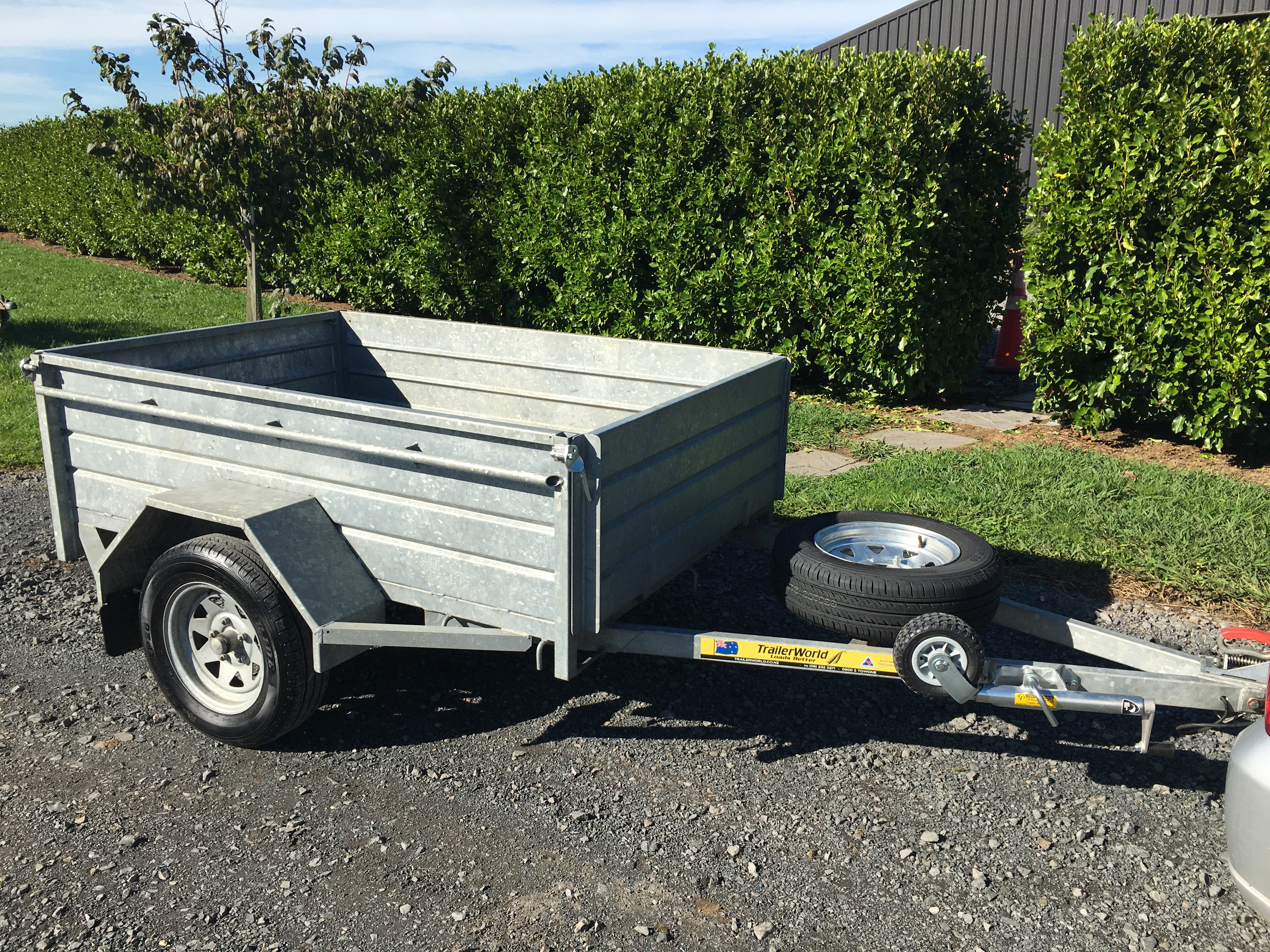
Tips For Safe Trailer Towing
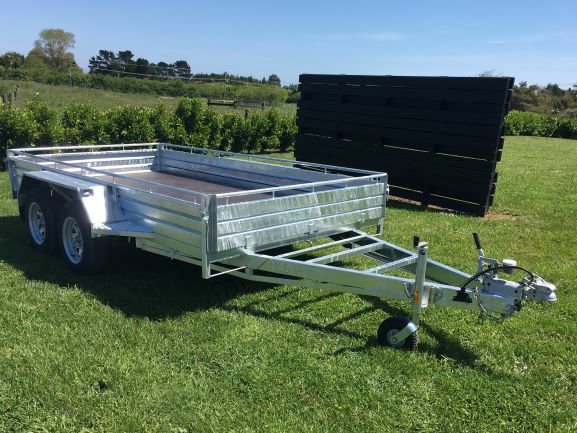
Top Ways to Use a Utility Trailer
Depending on their main purpose, utility trailers can be either large or small, open or enclosed, and they can also be very simple or intricately styled to fit your towing vehicle.
There are lots of reasons why investing in a well-built utility trailer is a great idea. And while you may come up with only a handful of ways to use it, in reality, once you have a trailer, you will find a lot more ways to utilise it than you can imagine.
Here are some ways you could use a utility trailer:
Carrying lawn equipment
Probably, the most popular utility trailer use. Whether you run a landscaping business or simply live in a rural area and need to haul your mowing equipment from one piece of property to the other, a utility trailer will be a great back-saving feature. It will allow you to easily load and unload your equipment several times a day without the help of ramps or a couple of strong people.Hauling power sports equipment & other vehicles
Another one of the most common uses of a utility trailer is to carry vehicles and power sports equipment.Maybe you like taking your ATV, Side by Side, or dirt bike out for a spin on the weekends. Or maybe you run a small business requiring transportation of multi-terrain vehicles. Utility trailers will make transportation simple, convenient, and cost-effective.
Moving Furniture and Appliances
Utility trailers will also make moving houses a million times easier. Furniture dollies easily roll up onto the trailer, making loading and unloading heavy furniture a breeze.Our flatbed furniture trailers are perfect for this application. They easily accommodate large furnishing items, allowing you to haul way more items than you could with a regular pickup, including double-door refrigerators, dining tables, sofas, and more.
Another great and highly reliable option for cargo transportation is luggage trailers. Whether you are moving, travelling to the airport, or just need to haul something from point A to point B, these trailers will get the job done while keeping your items safe and secure.
Transporting building supplies
Whether you are a contractor, home improvement professional or DIY homeowner with frequent projects needed to be done around the house, having a utility trailer is a must. It will make hauling wood, paint, ladders, and other supplies easy and effective while saving a great deal on delivery fees.If you are looking for something more compact to fit the budget, then our box trailer will be the perfect choice for you. It is highly versatile, built to last, and perfect for carrying small tools and equipment.
Rubbish and debris clean up
Cleaning up after a big job is much easier with a utility trailer. You can use it to effortlessly transport any rubbish or debris you need to get rid of in large quantities. If you work at a business often requiring the clean-up of scrap material, clearing out your own space, or helping a neighbour out – whatever the job, a utility trailer will definitely take a lot of the clutter and headache away.As you can see, there are plenty of reasons why investing in a utility trailer is a wise decision. But before you settle for one, you have to make sure you are getting the trailer that meets your demands perfectly. Make a choice between an open or covered trailer, pick the type you like, think about the preferred trailer dimensions, and leave the rest to the team at Trailer World. Speak to one of our experts today, and we will help you explore the options available or customise your trailer according to your needs.

